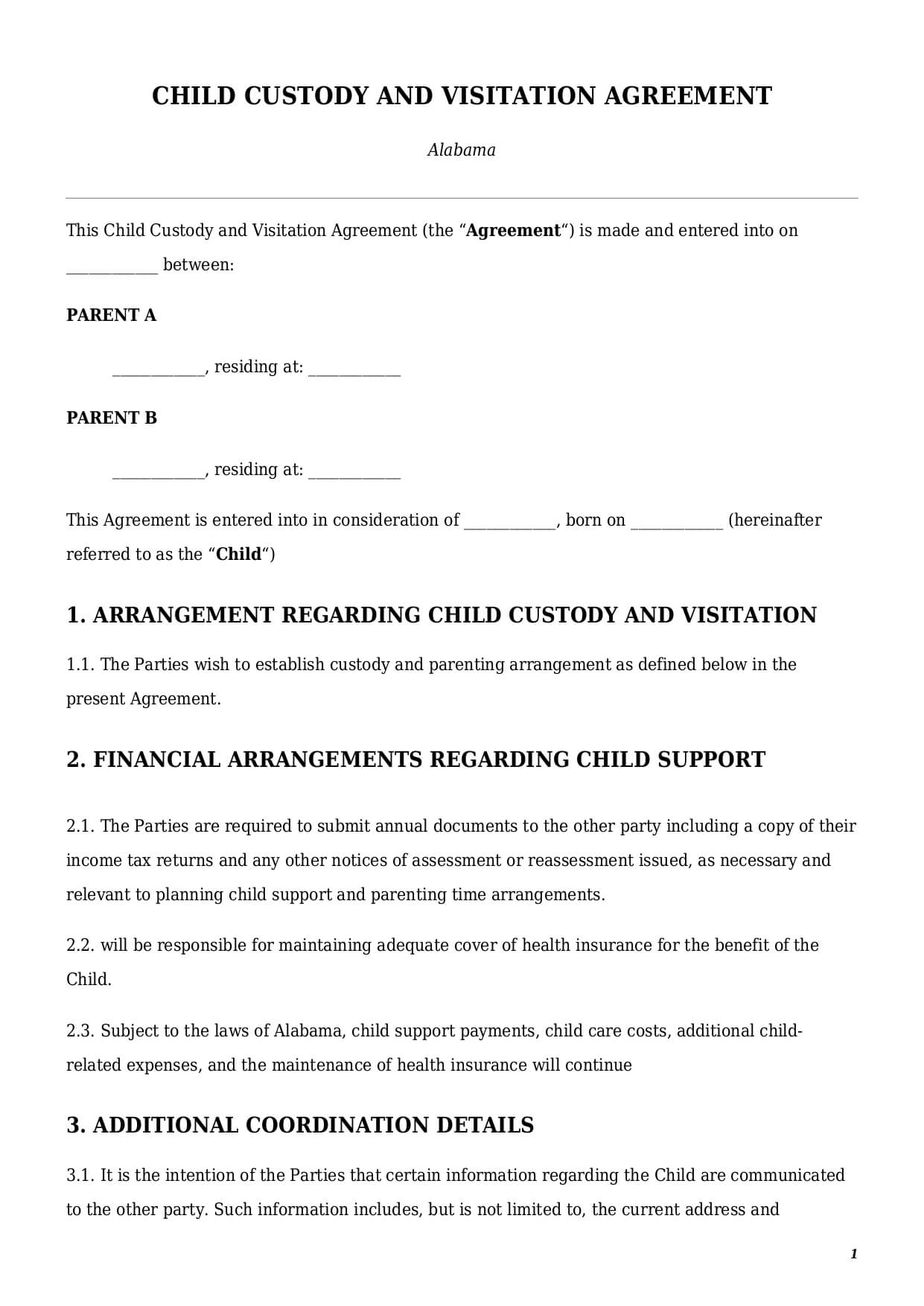Child Custody Agreement
Reviews


What is Child Custody Agreement?
A Child Custody Agreement (also known as a Parenting Plan) a legal arrangement between two parents regarding upbringing and co-parenting in the course of divorce or separation proceeding.
The agreement defines the following important considerations:
- the type of a custody over a child;
- visitation schedule for one or both parents;
- financial support of a child;
- medical and daily care;
- education.
A Child Custody Agreement will be suitable for:
- a couple who is in the course of divorce or separation process and who wants amicably to define co-parenting of their kids;
- two adults who co-parent, though are not in a formal relationship (e.g. marriage or partnership) at the moment; or
- a case when a child custody agreement is requested by a court/other state authority to finalize a divorce process.
What does ‘custody’ mean?
A Custody means a right of parents to decide important decisions related to their child’s life, health, education and general upbringing.
While a couple is married or live together, usually they have a joint custody over the children. However, once a divorce or separation is started, it is essential determine how the custody will be subsequently split between two parents.
The custody over children could be classified in few ways:
- by custody’s type: legal and physical;
- by parent’s role: sole, joint and split.
Legal Custody
The legal custody is meant to determine a parent who will be responsible for adopting the most important decisions related to health, education, religion etc.
A legal custody could be assigned to one parent or to both parents at the same time. Some courts may appoint first a temporary legal custody of one parent for the whole period of divorce procedure, and another parent for a permanent legal custody after the divorce is finalized.
If both parents plan to exercise a legal custody jointly, it means that all important decisions regarding a child’s life and development should be decided together. Those decisions may include, for instance:
- which school to attend;
- which extracurricular activities to participate it;
- which dental insurance to choose;
- which medical insurance is suitable for a child;
- if a child is sick, which medical treatment to take or which doctors to contact?
Physical Custody
The physical custody determines a parent with whom a child will be residing permanently. In most of the cases a physical custody is being assigned to one parent only.
A court is always acting in the best interest of a child while determining a permanent place of residence. Thus, a court may take into consideration opinion of a child or their siblings, the state of relationships between a child and a parent, as well as how such a decision will affect a child’s wellbeing.
Sole Custody
A sole (or full) custody means that either of the parents receives a full custody over a child. It means that one parent is being given only sole legal custody, only sole physical custody or both.
In practice courts may offer various hybrid solutions, when both parents exercise joint legal custody, while one parent has a sole physical custody.
Both mother and father could be granted with a sole custody over a child.
Joint Custody
A joint custody means that both parents are given a right to participates in a child’s life by exercising their custody together.
A joint custody is usually being given when a court sees that both parents can duly perform their parenting obligations towards a child. The schedule of work is closely taken into consideration to assess how effectively each of the parents is able to execute a custody.
Split Custody
A split custody is typical for a divorce of a couple with two and more kids, and means that either of parents receives a sole custody over a specific child. Practically speaking, one parent will obtain full legal and physical custody over one kid, while other parent will obtain full custody over another kids.
How to make a Child Custody Agreement template legally binding?
Identify all Children Involved
A Child Custody Agreement should be concluded with regards to all children a couple has. It is not acceptable to make a custody arrangement with regards to one child, while excluding another.
A custody agreement is suitable only for children under 18 years of age. A custody could be established as well with regards to children above 18 years of age, provided they are mentally or physically challenged.
Clarify all parenting arrangement
There are a lot of important things parents have to consider while filling in a child custody agreement template:
Financial Support and Maintenance
This is the most important part of all custody agreements involving children. Parents need to decide how the payments for essential and non-essential child’s monthly expenses should be allocated.
It is required that parents need to disclose all source of incomes they have, including wages, rental income, social benefits etc.
The amount of a child support paid by either of the parents should be reasonable with regards to the amount of income they have. Financial support payments should be paid regularly – biweekly or by-montly.
Parents can define their financial support payments directly in the child custody agreement, or use a separate child support agreement.
Visitation Schedule
The type of selected custody significantly influences visitation arrangements. If one parent gets a solo physical custody, the other parent should seek to establish the following:
- Exact dates of the week when a child could be picked up;
- Pick up and drop off location;
- Time for pick up and drop off;
- Places for meeting (e.g. park, shopping mall etc.)
If parents share a joint physical custody, in that case parents have to work together to select the best visitation schedule. The visitation schedule should consider school/daycare timetable, as well as child’s preferences and could be organized as follows:
- Weekly visitation (according to which one week a child resides with one parent, while the other week a child is being transferred to the other parent);
- Monthly visitation (according to which one moth a child resides with one parent, while during the next month a child will live with another parent).
Holiday Schedule
A Child Custody Agreement template allows to determine with whom child should spend the most important holidays through the year, including Christmas, Mother and Father’s Day, Independence Day and so on.
Other Arrangements
Parents have to decide regarding expenses related to scheduled and emergency medical care for their children, dental insurance and other out pocket expenses.
The expenses mentioned above should not be confused with regular financial support payments mentioned above.
Make both parents to sign a document
Once the document is ready, parties have to read it carefully to make sure all their intentions are well fixed on the paper. After printing out the document it should be signed in person by both parents.
It is highly advisable for both parties to review a child custody agreement prior to its signing.
A child custody agreement becomes binding after its signing by both parties. After its signing, the law does not require to notarize a document. If parties wish so, they can ask two individuals to witness signing a document. A witnesses’ signature should be on the document as well.
Table of content
Frequently Asked Questions (FAQ)
-
1. What is the difference between Child Custody Agreement and Child Support Agreement?
A child custody agreement is a more complex document, which defines all possible arrangements for co-parenting, including custody, visitation schedule, financial support, medical care etc.
Unlike a custody agreement, a child support agreement is a relatively simple document aimed to clarify the amount and schedule of support payments paid by either parent. It may also set up conditions under which the amount of payments should be revised. While some parties prefer to have all the arrangements in one document, other families may choose to divide financial and non-financial matters in different documents.
-
2. What is the biggest mistake in a custody battle?
In most of the cases an absence of well drafted child custody agreement can lead to a custody battle. When all the important terms are set up on the paper first, the child custody agreement becomes binding for both parties. Even if one party fails to perform their obligations at some point, a child custody agreement could be enforced further in the court.
A custody battle could be easily avoided if the following pre-conditions are met:
- Sign with your partner a child custody agreement well in advance before the divorce or separation officially starts.
- Do not hesitate to clarify with your parent every specific point of your parenting plan, including holiday arrangement, visitation schedule, preferred type of physical and legal custody etc.
-
3. Who is most likely to get full custody?
A full custody could be assigned in two ways. First way, is to have a child custody agreement prepared well in advance. Once the divorce takes place, parents have a binding document determing the type of a custody they both agree on.
If there is no arrangement regarding a custody, a court is usually involved to decide on the same. There is no rule of thumb regarding how to get a full custody. Both parents have equal chances to seek a full custody.
A court is required to act in the best interest of a child while deciding on the type of a custody. Either parent’s behavior, financial circumstances and social background are considered as well to make the final decisions.
-
4. Why is joint custody the best?
A joint custody guarantees that both parents are equally participating in a child’s life. If talking about joint physical custody, it also ensures that a child has an opportunity to spend time as much as possible with both of their parents.
Though joint custody might be hard to reach because of potential controversies between ex-partners.
-
5. Can i leave the state with my child if there is no custody agreement?
Yes, you can travel outside your state or the US with your child, provided you have been given a solo legal and physical custody over a child by the respective court custody order.

Looking for something Different?
Start typing to find out our collection of legal documents and contract templates
